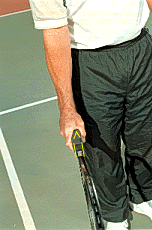|
TennisOne Lessons

Volleying A Ball Hit Into the Body
by Mike Estep
Director of Tennis, Ridglea Country Club, Former coach of Martina
Navratilova and Arantxa Sanchez Vicario
Photographs by Steve Margheim
GRIP
The volley grip is the same for both my forehand and backhand volleys. The
grip in the picture below is frequently called a continental grip. Beginning
players may find this awkward and indeed I learned to volley with separate
grips, changing to this grip for all volleys when I was about 17. Perhaps
lack of forearm strength and lack of experience are good reasons to change
grips while you are learning. But as you develop, you should try to
use one grip, especially for times such as the "body volley."
Note the knuckle of my right forefinger is roughly centered on the first
bevel to my right of the top level of the handle. There is a "V"
formed between my thumb and forefinger. That "V" is at the crease
of the top level and the first side level.
CONCEPT
The concept of a volley is to make contact in front of you. Balls hit to
either side of you are easy to determine which shot to play (forehand or
backhand), but a difficulty arises when deciding how to play a ball coming
directly at you. The answer is easy. All shots at the body should
be played with a backhand volley! The reason is simple. Your "middle"
in tennis is not your belly button but your racquet hand! Everything on
the inside of your racquet hand (hanging by your side) should be played
as a backhand. Of course if you have time to move, you may play the ball
any way you wish. But without the luxury of time and the ability to change
your position, a forehand volley is almost an impossibility. However, it's
child's play as a backhand volley.

Go To:
Next Page
Tennis Lessons Library
|
|
|